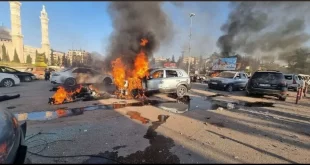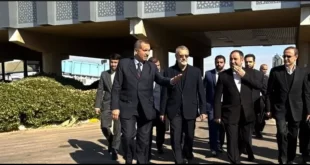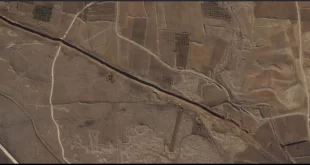Sep 24, 2013, al Akhbar
The narrative of the Syrian revolution is an official version of events: All Western media and governments (and all Arab oil and gas media and governments) are expected to strictly adhere to it, and they all do, without dissent. All accounts of the beginning, evolution, and possible conclusion of the Syrian conflict are uniform, as if synchronized by central casting. But one of the most persistent version of events of the Syrian conflict has to do with the birth of the armed rebellion.
In all accounts of the Syrian conflict that one reads in the press and on websites, it is said that the Syrian uprising (or even “revolution”) started peacefully, but that the regime turned it into sectarian armed conflict. This official notion is repeated so many times in statements by US officials and in editorials and columns that no one bothers to question. One is expected to accept it – in the form of theological dogmas – without asking questions and without raising doubts. Just like in religious belief, raising doubt can get one to be censured or rebuked or even accused of Tashbih tendencies.
But was that really what happened. I, of one, signed a petition along with a few comrades of mine in Lebanon early after the beginning of the Syrian uprising, and we denounced the brutality of the regime and we mocked the version of events being peddled by the regime: We dismissed the notion that there were armed gangs roaming the country and shooting at people. In hindsight, I was wrong and the regime that has a history of lies and fabrication (although the Free Syrian Army’s record of lies and fabrication easily topped that of the Syrian regime) may not have been inventing stories of armed groups early in the history of the Syrian conflict.
The New York Times and other Western media even invented the story that the uprising was actually secular, but that the regime (through blatant sectarian discourse, according to accounts by Beirut bureau chief of the Times, Anne Barnard, although the paper later had to print a correction to account for the lie of Ms. Barnard) incited sectarianism in society including in speeches by Bashar himself who referred to his enemies (according to Ms. Barnard and others) as “Sunni terrorists.” But if we are to interrogate this claim (and this claim does not in any way change the fact that the regime has a sectarian basis of support and that Hafez al-Asad built his regime on the basis of minority Alawite loyalty), does that mean that all those sectarian bands and gangs in Syria were formerly secular, but turned to Salafi and other forms of hate groups by a speech or two by Bashar?
But let us go back to the story of violence and how the conflict turned violent. In the beginning of the Syrian conflict, there were acts of violence going on. The notion of a peaceful, pacifist Arab “spring” appears to be the invention of PR firms hired by the US government or wishful thinking of Western journalists, or both. Or this story of Gene Sharp (remember him, anyone?) as the real instigator of the Arab “spring,” which was quite influential in The New York Times among other Western media, now it is mocked rather than believed.
The Free Syrian Army was declared as an armed defense group (just as the Israeli terrorist, colonizing and occupying army is a “defense force”) which only serves to protect unarmed demonstrators. But the Free Syrian Army never seems to have performed that role. And what about the accounts of early shooting and bombings, which were registered in Syria long before the formation of various bands and brigades in Syria?
Given the heavy hand of outside intervention in Syria (especially, Turkey, Saudi Arabia, Qatar, and Israel), it is far more likely that there were many sleeper armed cells all over Syria and that those external powers gave the orders to start once the momentum of the popular uprising began.
This is not in any way to cast doubt on the motives of the thousands of civilian demonstrators who took spontaneously to the streets all over Syria to protest against a repressive and corrupt regime. The Syrian people have a million reasons to want to rid themselves of the regime (although a substantial section of the Syrian population – and that section may have grown thanks to the misdeeds and thuggery of the armed groups – remain loyal to the regime for a variety of reasons) and many hoped to cause change in Syria peacefully. Those were the folks who were chanting: peaceful, peaceful. But it is not clear that those same people who chanted “peaceful” later turned to guns and immediately found various weapons at their disposal, and then quickly espoused violent ideologies. Most likely, the people who turned to arms are not necessarily the same people who took peacefully to the streets.
There was a violent plan for Syria long before the Syrian uprising began. Saudi Arabia, Qatar, and Israel all had their favorites and their agents inside Syria and were ready to strike. It is to be remembered that all three states have a heavy presence in Lebanon and would have had an easy time (especially through the sinister Intelligence branch of Lebanon, which answers to Saudi and American intelligence services) to fund and smuggle fighters into Syria.
No, the Syrian uprising did not start peacefully and then suddenly degenerate into one of the most violent and vicious and sectarian conflicts. It is demeaning to the Syrian people and to the motives of the early demonstrators to believe that. There was an armed rebellion or movement that started very early on and which ran parallel, or in opposition to the peaceful protest movement. The armed rebellion basically gradually and steadily hijacked the Syrian uprising and diverted it according to the wishes of foreign intelligence services. This scenario is more plausible than the fictional story peddled, almost word for word, in all Western media accounts.
 Syria Support Movement solidarity with the Syrian people
Syria Support Movement solidarity with the Syrian people




